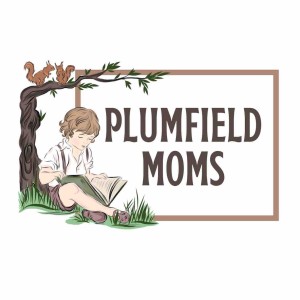Plumfield Moms
We are sisters in Christ who became friends over a shared love of Truth, Goodness, and Beauty, found especially in good and great books. Our primary vocation is that of marriage and motherhood, but we feel a secondary call, as educators and homeschool moms, to walk with families who are seeking to help form souls who are capable of responding to the vocation God has called them to. Our objective is to form our children and grandchildren to the best of our ability, and in so doing share what has been meaningful to us with others that it may encourage them and lighten their burden. As homeschoolers, classical educators and Christians, we have a passion for the ancient Greek paideia and the loving education of Louisa May Alcott‘s Plumfield (from her novel Little Men).
Episodes

Saturday Mar 15, 2025
Saturday Mar 15, 2025
More than once, Paul asks his children in the faith to imitate him. That isn’t easy, but it does sound nice when he says, “Be kind to one another, tenderhearted, forgiving one another.” And who doesn’t wish to have the Fruit of the Spirit: love, joy, peace, patience, kindness, goodness, faithfulness, gentleness, self-control.
When he says, “be imitators of me, as I am of Christ,” what do you imagine this encompasses? He tells the Philippians to have the same mind as that of Christ Jesus and then elaborates. Jesus made himself nothing, took the form of a servant, humbled himself, and was obedient to the point of death on the cross.

Monday Mar 10, 2025
Monday Mar 10, 2025
The Viking Quest series by Lois Walfrid Johnson is a truly excellent historical fiction saga that immerses teen readers in the riveting world of the 10th century. Spanning five books, this series transports readers from the lush coasts of Ireland to the cold farms of Norway and then to the icy shores of Greenland (and beyond), always incorporating the fascinating culture of the people in those places. An exciting story of adventure, hardship, faith, and conversion, this is a story that young readers will find hard to put down.
Briana O’Toole is a strong and faith-filled young Irish girl. When she saves a Viking boy about her age from drowning, she is repaid for her kindness by being kidnapped and whisked away to Norway as a slave. Briana’s courage, determination, feisty temper, and unwavering faith become a witness of hope, not only for her fellow Irish slaves but for the Norse people she learns to love during her captivity. Despite the trials of being thrust into a foreign culture, Briana holds fast to her beliefs, and she becomes “a light to the nations.”
Mikkel, though initially driven by ambition and greed, is a fascinating foil to Briana. His loving, wise, and influential parents intended him to be a merchant – not a raider. As he says at the end of the last book, “They have always been on your side, Briana.” Their leadership in his life, and Briana’s witness, encourage a gradual transformation in Mikkel’s way of thinking. Despite his being her captor, Briana comes to truly care for Mikkel, and few are in doubt that he is falling in love with her. But, the story is nuanced and there are several other important characters who add richness and complexity.
The series is notable for its historical accuracy and vivid descriptions. From the flourishing landscapes of Ireland to the rugged beauty of Norway, and the exotic but cold Greenland, each setting is richly portrayed, offering a feast for the imagination. The author did extensive research and was careful to include things like descriptions of trees that were local to Mikkel’s fjord at that time but are scarce today. Readers will not only be entertained by the gripping plot but also gain a deeper appreciation for Norse culture, geography, and the complexities of early medieval life.
At the end of each book, the author leaves extensive notes explaining which old tales inspired certain plots or aspects of each story. In the last two books, Leif Ericsson is a central character and an ambassador for King Olaf’s decree that all of Norway and Greenland become a Christian nation.
As Briana matures over the five books, the narrative becomes increasingly thoughtful and profound, delving into themes of faith, redemption, and finding one’s place in an unfamiliar world. This is a story of resilience and conversion, showcasing the power of living out a Christ-centered life even in the face of adversity. And, of course, towards the end, we witness several chaste and gentle romances.
Perfect for readers who love adventure, history, and stories of faith, The Viking Quest series combines action, romance, and spiritual growth in an unforgettable journey. Whether read for pure enjoyment or as a supplement to studies in geography and history, this series is a treasure that will captivate and inspire young and older readers alike.

Saturday Mar 08, 2025
Saturday Mar 08, 2025
In this life, I will sometimes feel like a cat in a room full of rocking chairs. In the profusion of chairs my tail is likely to get caught once in a while. If I don’t get down from my comfortable perch and regularly exercise my discernment muscles, I will become trapped and useless. I can’t sit around yowling about my tail. Rather than seeking my comfort, I ought to be seeking to glorify Christ. My moderation should become evident to everyone.

Monday Mar 03, 2025
Monday Mar 03, 2025
Up a Road Slowly by Irene Hunt is a lovely and thoughtful coming-of-age story about a young female writer. Though not strictly autobiographical, the novel brims with emotional authenticity and bears notable similarities between Hunt’s life and the lives of her characters. Like her protagonist Julie Trelling, Hunt grew up in the rural Midwest. Julie’s Aunt Cordelia, a strong and nurturing figure, mirrors Hunt’s own experiences as a schoolteacher before her retirement in 1961. As I read, I couldn’t shake the feeling that Hunt had poured much of herself into both Julie and Cordelia, crafting characters that felt deeply personal and vivid.
When the story opens, seven-year-old Julie Trelling is considering what is about to become of her in the wake of her dear mother’s death. Her loving father is deeply grieved and ill-equipped to handle Julie and her ten-year-old brother, Chris. The extended family decides to keep Julie’s teen sister, Laura, with their father and to send the younger children to live with spinster school teacher Aunt Cordelia in the country.
In Aunt Cordelia’s country home, the children find their aunt to be strict and formal, both at home and in the classroom. Cordelia insists on calling them “Christopher” and “Julia,” signaling her formal ways. Yet, under her watchful and loving care, Julie and Chris both grow and flourish.
Aunt Cordelia’s past is marked by a poignant romance with a brilliant young man, Dr. Jonathan Eltwing. Their lives pulled them in different directions, and they never married. As Julie enters her teen years, Jonathan returns to town with a gravely ill wife who ultimately passes away. His renewed friendship with Cordelia allows him to see the parallels between Julie and her aunt in both appearance and personality. Though Julie resists the comparison at first, she eventually embraces it, feeling proud to share in her aunt’s strength and character.
The story delves into everyday themes that define classic literature for young girls. Despite being set in the indistinct 1950s or 60s, it evokes the timeless quality of Lucy Maud Montgomery’s and Gene Stratton-Porter’s works. In a different way, it also brings to mind the family dynamics found in Sterling North’s Rascal.
As Julie matures, her sister Laura marries and has a child, leaving Julie both happy for her sister and heartbroken by the sense of being left behind. While Julie is in high school, her father marries a city schoolteacher named Alicia. While Julie and Alicia quickly become friends, Julie notes that her father and stepmother are more like “weekend parents.” After some turmoil, Julie remains in Aunt Cordelia’s home, commuting to town for school.
Julie’s high school years are marked by romance with Brett Kingsman. She fancies herself in love. Her family, however, sees Brett’s flaws and grows concerned. When Brett ultimately betrays Julie’s trust, her heart breaks. But, like any good story of this kind, Julie’s story ends extremely well.
Up a Road Slowly is a lovely, ordinary, and delightful story—a perfect gift for a young lady seeking a thoughtful and heartwarming read.

Saturday Mar 01, 2025
Saturday Mar 01, 2025
Surely my faith needs to be increased. I need to view situations as they truly are – absolutely in God’s control.
I have to remember the person my faith is in – the Ruler of the universe. My problem is not a problem for him.
Be still my soul: the waves and winds still know
His voice who ruled them while He dwelt below.

Monday Feb 24, 2025
Monday Feb 24, 2025
When Ember’s End was released, many Green Ember fans wondered if it marked the conclusion of the beloved series. Yet, S. D. Smith continues to surprise and delight us with new stories that delve deeper into the Green Ember world.
When I spoke with Smith this summer, he mentioned that this might be the first year without a new Green Ember story. Imagine my surprise and excitement when a novella appeared in my inbox, simply titled: “A surprise new Green Ember book in time for Christmas!”
The Lost Key is an exciting short story that transports readers back to the events at Halfwind Citadel. Nestled between The First Fowler and Ember Falls, The Lost Key is packed with suspense, action, and a high-stakes quest to uncover the mysterious “lost key.” This novella has everything fans have come to love: the return of old friends, lots of humor, an exciting adventure, answers to old questions, and a setting we love. The stakes are high: there’s a traitor in their midst, wolves closing in, cryptic clues to decipher, and a desperate race to protect their world.
Smith’s signature style blends heart-pounding action, unexpected twists, mystery, and the warm humor that is a hallmark of the Green Ember series. Jo Shanks’s gentle side gets some well-deserved attention, and Picket and Helmer’s antics make us laugh out loud, as usual. Parents might chuckle—or cringe—at the “zipline” escapade, while kids will undoubtedly be inspired by the courage and cleverness of their favorite characters.
And just when you think the story has reached its conclusion, Smith delivers a delightful surprise: a bonus short story tucked at the end. This unexpected treat hints at even more adventures to come, leaving readers with a renewed hope for future Green Ember tales.
The Lost Key is a perfect Christmas gift for fans of the series and its small size guarantees that it will fit into most stockings. Thank goodness we have some Green Ember goodness to put under the tree again this year!

Saturday Feb 22, 2025
Saturday Feb 22, 2025
Because the passions of the flesh are waging war against our souls (1 Peter 2:11). As Jesus warned, our flesh is weak. It wants us to give in to our passions. Giving in, lying down, closing our eyes for just a minute, is so much easier than going to war against them. Especially if our passions have become our bosom companions.
Wage war? How?
Wake up and pay attention. In his second letter, Peter twice states his intention of waking us up completely, stirring us up.

Wednesday Feb 19, 2025
Wednesday Feb 19, 2025
Thanks for listening! We are so glad that you are here! We open the episode with some of our banter. You won't hear the intro music for about 90 seconds.
The 21st Century Pack Horse Librarian
1819 News Article
Librarians in the News (at The Card Catalog)
UV Light Bulbs
Ozone Generator
Dehumidifier
Reading Stand
Kindle Clicker
Purple House Press 25th Anniversary Sale
Living Books Press
History Shapers at Living Book Press
The League of Lending Librarians
Private Lending Library Directory
Tell us your story!
Biblioguides
Semicolon
Book Review Roundup
Mighty Networks
Shelf Notes
Picture Book Preschool
LibraryThing
TinyCat

Monday Feb 17, 2025
Monday Feb 17, 2025
Having just finished another Ann Rinaldi novel, My Vicksburg, I find myself reflecting on some disturbing patterns that mark her work. Rinaldi’s books are nothing if not uneven. At their best, they provide interesting, historically rich narratives with strong female protagonists; at their worst, they lean into a troubling subversiveness that seems to delight in portraying rebellion marked by deception and manipulation as a moral good.
In My Vicksburg, Rinaldi focuses on a little-known but true fact: during the Union siege of Vicksburg, residents of the town moved into caves to live away from the mortar blasts. The story revolves around Claire Louise, a teenage girl living in one such cave with her mother, younger brother, and one of the family’s slaves. Claire Louise’s father is a Confederate doctor, her 26-year-old brother, Landon, is a Union doctor. The family’s other slaves remain at the family home, guarding it from looters, despite the danger of cannon blasts.
Compared to other Rinaldi works I’ve read, the “scandal” in this book is significantly toned down. Claire Louise’s acts of rebellion are relatively restrained, yet they still hinge on dishonesty and betrayal to move the plot forward. For instance, when Landon reunites with his family, he brings along a Confederate soldier and patient named Robert, who has become his friend. Landon is principled and deeply conflicted because Robert is responsible for Robert E. Lee’s “lost order,” which contributed to the South’s loss at the Battle of Antietam. Landon knows he must report Robert despite their bond, a decision he struggles to make.
Claire Louise (13), however, becomes infatuated with Robert (26) and goes to great lengths—including lying, sneaking around, stealing, and betraying her brother—to help him escape. Her justification is that she’s sparing her brother the anguish of making a choice he couldn’t live with. Yet, her actions raise significant moral questions. The plot subtly frames her deceit and betrayal as self-sacrificial, even noble, glossing over the unsettling implications of a romance between a teenage girl and a dishonorable adult soldier.
This reflects a larger trend in Rinaldi’s writing: her female characters consistently find themselves in opposition to male authority figures—often middle-aged men—and are forced to resort to morally dubious methods to assert their agency. This pattern is no coincidence. In the author’s note, Rinaldi reveals a fraught and emotionally distant relationship with her father, suggesting this dynamic influenced her storytelling. While this personal context is compelling and provides a lens through which to view her work, it also highlights a troubling aspect of her narratives. Rinaldi doesn’t merely present flawed characters; she elevates their deceit and rebellion as necessary—sometimes even noble—means of empowerment.
What’s most unsettling is how often her characters’ defiance is entwined with manipulation, often portrayed as the only viable path to power for women. This betrayal of her professed feminism feels particularly glaring; instead of showing her heroines as capable of achieving power through strength, intellect, or collaboration, she repeatedly depicts them resorting to unscrupulous tactics.
While My Vicksburg avoids the sexual undertones present in some of her other works, the troubling moral message remains. I don’t object to flawed characters or morally complex narratives. But I do object to an author who seems intent on teaching young readers—particularly girls—that the only way to challenge oppression or assert themselves is through deception and betrayal. It’s a reductive and disheartening message, especially given the richness of the historical settings and the potential for more nuanced portrayals of female empowerment.
While My Vicksburg offers intriguing historical insights, such as the cave dwellings of Vicksburg’s residents, its moral undertones leave much to be desired. Claire Louise’s rebellious actions and her unsettling relationship with Robert subtly reinforce the idea that good ends justify immoral means. Readers should approach this book with caution, particularly when recommending it to young audiences.

Saturday Feb 15, 2025
Saturday Feb 15, 2025
“Whoever says he is in the light and hates his brother is still in darkness. Whoever loves his brother abides in the light, and in him there is no cause for stumbling. But whoever hates his brother is in the darkness and walks in the darkness, and does not know where he is going, because the darkness has blinded his eyes” (1 John 2:10).








